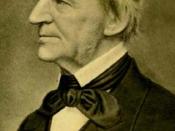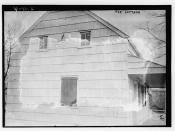The nineteenth century began with the American literary renaissance known as the romanticist era. Throughout this period, many of America's great writers emerged, one of the most famous being Edgar Allan Poe. Poe lived a troublesome life; physically and emotionally. After the death of his mother, and abandonment of his father, he was taken in and raised by a foster family. The fact that he was never formally adopted, and that his own father left him made him feel unwanted. His life took a downward spiral from thereon, leading him towards drugs and alcohol abuse. Although Poe's life was overshadowed by hardships, it is remarkable that the content and the quality of his literature are so outstanding. His horrifying stories captivate the reader in terror through the use of vivid details and figurative language, while his diction gives the literature a rhythm that allows for the story to flow like a piece of music.
Despite his talent, Poe has faced much criticism, as has his literature; often being accused of being nothing more than a mad drunkard and a "jingle-man," as Emerson once said. Furthermore, Henry Longfellow once referred to Poe's literature as "one third genius, two thirds fudge." However, these allegations are wild and outlandish; for a mad drunkard would certainly not be capable of composing such works of literary genius.
Ultimately, it is up to the reader to determine for him or her self how well a piece of literature was written. Controversy arises over the work of many distinguished writers, but none so diverse as that which arises over Poe's. Henry Longfellow and Ralph Waldo Emerson have been quoted, harshly criticizing Poe's work; basically saying that it had no substance to it and it was shallow, meaningless, dribble that somehow flowed together. It was said that Poe's work was empty and he used sound as a sort of filler; using assonance, consonance, alliteration, repetition, rhythm, and a rhyme scheme to make his stories and poems sound respectable.
Most of Poe's critics were, in fact, great writers themselves. Their criticism of Poe's work, however, is undeserved. All of Poe's literature has a purpose, and is worthy of being considered great American literature. His works elevate the senses of the reader through figurative language and sound, captivating him or her with terror and beauty at the same time; thus exciting the soul. For instance, the line that opens "The Fall of the House of Usher;" "During the whole of a dull, dark, and, soundless day in the autumn of the year, when the clouds have hung oppressively low in the heavensâ¦" clearly establishes a gloomy mood; overshadowed by the inherent death that autumn brings each year (Usher, 208). However, the sentence also uses alliteration and the harsh "d" sound gives the reader a negative connotation. Clearly the sentence is more than a simple jingle. It serves to establish an image in the reader's mind, a mood, and at the same time has a flowing sound that makes even the most depressing line sound magnificent and intriguing. This is part of Poe's single effect technique, in which he believes that the reader should be able to sense a certain effect immediately when reading the story, and be able to finish the story in one sitting. The first few paragraphs of the story set the mood, and describe the setting so vividly that the reader can picture the decaying house; enclosed in trees and a stagnant moat that seem to cut it off from the outside world. As the narrator arrives, he says "â¦when I again lifted my eyes to the house itself, from its image in the pool, there grew in my mind a strange fancy - a fancy so ridiculous, indeed, that I but mention it to show the vivid force of the sensation which oppressed me." (Usher, 210). This is another of Poe's techniques; the use of the duplicate, better known by the German word "doppelganger." Poe uses doubling to convey an eerie feeling to the reader that is frightening and perplexing at the same time. Moreover, Poe asserted that a story should be written to follow the initial effect, and every character and detail thereafter should contribute to that effect. Poe continues to create an uncomfortable and peculiar mood throughout the story through the setting and characters, many of which are allegories. He also maintains the use of the doppelganger, which becomes apparent when the narrator meets Roderick and his double; his twin sister Madeline.
Poe was not only a great writer of prose, for he was also a remarkable poet as made evident by "The Raven." Poe once again begins by describing the setting and establishing the mood. The poem is written in trochaic verse, and contains sound devices such as assonance, consonance, and alliteration in order to give the poem a musical quality. It is for this reason that Poe may have been referred to as a "jingle man," but that has nothing to say about the quality of his work. Being able to make literature sound musical, while it provokes thought and elevates the senses of the reader so greatly, is truly a masterful task. Poe's brilliance can be seen in lines such as these: "While I nodded, nearly napping, suddenly there came a tapping, / As of someone gently rapping, rapping at my chamber door" (Raven, Lines 3-4). Poe uses alliteration of the harsh "n" sound and a rhyme scheme to give the poem a harmonious melody. At the same time, the trochaic verse of the poem puts a stress on every third syllable, giving the poem a hard and somewhat daunting sound. In addition, at the end of several stanzas, the phrase "Quoth the raven, 'Nevermore.' " is used in a repetitious manner. This places emphasis on the line, thereby making it evident the importance of Lenore, who is, as the raven quotes; "nevermore". Poe continues with his poetic genius throughout the poem, but the last stanza is where one can clearly see that Poe is a worthy canon of the great American writer. The last stanza reads: And the Raven, never flitting, still is sitting, still is sitting On the pallid bust of Pallas just above my chamber door; And the eyes have all the seeming of a demon's that is dreaming, And the lamp-light o'er him streaming throws his shadow on the floor; And my soul from out that shadow that lies floating on the floor Shall be lifted--nevermore! Here Poe uses his single effect technique in establishing the prevalence of a frightening mood, while there is a melodic quality due to his choice of diction, and symbolism through an allusion to Greek mythology. The raven sits upon the bust of Pallas, the Greek goddess of wisdom; thus symbolizing the raven's superiority over her mind and body. Comparable to the goddess of wisdom, the narrator sits and reads to gain knowledge. However, the raven is toying with the narrator's mind slowly driving him to the brink of insanity, thereby proving its superiority and control.
Though great writers themselves, it is apparent that Longfellow and Emerson were poor critics of fine literature. Their assertions that Poe does not deserve to be recognized as a great American writer are grossly unjust. Poe is perhaps one of the greatest American writers, for he is able to write such complex literature that invokes thought and imagination, while captivating the reader with its beauty. It is quite possible that Poe is a far more skilled writer and artist than many of his critics. And as for the fact that his writing is comparable to a piece of music does not make him only mere "jingle-man", but instead; that, and so much more.
(This essay was written by virgil, and got a 100 from a teacher who doesnt give over a 95;])





